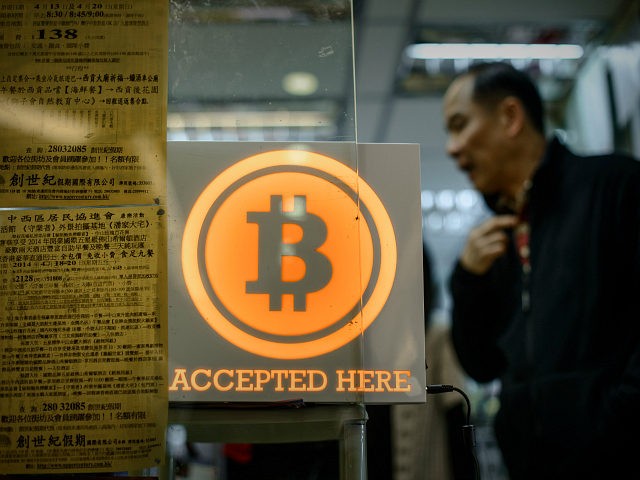The Chinese Communist government views market power as a weapon for achieving geopolitical dominance, so it comes as no surprise that Beijing is cracking down on Bitcoin and other cryptocurrencies, viewing them as an unacceptable dilution of state power over the economy.
“Regulators have decided on a comprehensive ban on channels for the buying or selling of the virtual currency in China that goes beyond plans to shut commercial bitcoin exchanges, according to people familiar with the matter,” the Wall Street Journal reported on Monday.
The plan was presented to industry executives at a closed-door meeting in Beijing on Friday. Attendees were reportedly surprised by the extent of China’s plans to block Bitcoin transactions, all the way down to the level of individuals conducting small one-on-one exchanges. The WSJ describes China’s plan as “some of the most draconian measures any government has taken to control Bitcoin.”
Beijing is generally displeased with any medium of exchange that could threaten central government control over the economy or prevent the government from precisely tracking the movement of every unit of currency. A previous crackdown eight years ago was directed at the virtual tokens used in online gaming systems. The anti-Bitcoin effort is even more aggressive, with Chinese exchanges announcing such rapid shutdowns that the global value of the digital currency tumbled over 25 percent in the span of two weeks.
The Wall Street Journal notes that Beijing is picking a fight with Bitcoin that it could conceivably lose. As with every clash between the government and the Internet, it is not certain that even a repressive authoritarian system like China’s can completely control the movement of data. Evidently, some Chinese Bitcoin enthusiasts believe they can continue making transactions over effectively unbreakable encrypted platforms such as the Telegram messaging app.
On the other hand, the breezy confidence of Internet enthusiasts in digital freedom is about to be tested by some prosaic real-world conditions, namely that Bitcoin needs physical servers to process transactions and some of them are very much within reach of Beijing’s army of regulators.
A great deal of monetary value is on the line, which might explain why Beijing is curiously reluctant to formally declare the war on Bitcoin that it’s evidently committed to fighting. The WSJ mentions that, in the span of just one year, China fell from the world’s top Bitcoin market to only a 15 percent share. Vast Bitcoin-mining operations will soon crash to a halt if Beijing has its way. And another interesting real-world detail: China’s formerly dominant position in Bitcoin mining was partially driven by the ready availability of cheap electricity to power servers in rural provinces.
The Journal suggests cracking down on Bitcoin might be part of the Chinese government’s perpetual war on corruption — or, more cynically, its perpetual effort to be seen by citizens as waging energetic war upon corruption — but the major reason is clearly to maintain tight government control over the financial system.
Such control is a major element of China’s strategy for assuming global hyperpower status, as a Spengler op-ed at Asia Times on Monday made clear. China’s economy has largely rebounded from its 2015 stock market bubble pop, clearing away a mountain of debt accumulated in the aftermath while retaining most of its production and investment capital.
Strategic currency manipulation was a major instrument in that recovery, as was China’s aggressive use of its sealed markets as leverage against Western corporations. Spengler quotes an August 4 New York Times report that noted American companies have been “forced to transfer technology, create joint ventures, lower prices, and aid homegrown players” in exchange for access to the huge Chinese consumer base.
“America’s top of the line tech companies have been selling their family jewels to China for years, as a condition of entry into the Chinese market,” as Spengler puts it.
The result is that America created “every important invention in the digital age, from integrated circuits to semiconductor lasers, solar cells, flat panel displays, sensors and light-emitting diodes,” but now Asia produces most of it. China is poised to either control or manipulate most of that production. China’s massive “One Belt, One Road” trade project will project that influence far beyond Asia; Iran and Turkey are already making plans to integrate themselves with the Chinese economic project.
Concerned Americans are advised not to hold their breath waiting for anyone in the West to halt China’s march to economic checkmate.
“To my knowledge, the only senior adviser to President Trump who proposed to stop this practice was Steve Bannon, who left the White House in August,” Spengler notes. “Interfering with US companies’ tech transfer to China would hurt revenues in the short- and medium-term. US companies are making a good living on the rise of China, and CEO’s worry about their stock price during the next five years, not about America’s competitive position in 10 years.”
It’s easy to see why Beijing doesn’t want cryptocurrency dice bouncing across its chess board while it seeks to implement such a patient and disciplined long-term strategy. Meanwhile, the West can scarcely muster the political will or economic discipline to move a pawn. Perhaps covertly encouraging the development of a cryptocurrency black market in China would give Beijing a few headaches.

COMMENTS
Please let us know if you're having issues with commenting.